
In the history of China, dazzling cultural relics have appeared, of which bronze is a very important species. They themselves were used as vessels for use, and later as ceremonial vessels for sacrifice, and only the nobles were entitled and powerful to possess. The importance of bronze lies not only in its use, but also in the inscription on it.
The inscription engraved on the bronze vessel is called the golden script. The content of the gold text is very extensive, generally recording the reason, time, person and so on for which the bronze was made. Like the Oracle, they became an important reference for the history of the time in later generations. For example, the Western Zhou Ligui, which has only 4 lines and 33 characters, has become a national treasure because it records the famous historical event of the Wu King's cutting.
Another example is the famous Mao Gongding, whose inscription is nearly 500 words, which is the bronze with the most inscriptions except for a few bronze Zhong, which also makes it famous overseas. The number of Jinwen was very large at that time, and according to the paleographer Rong Geng's "Jinwen Compilation", the number of Jinwen was 3722, which was still growing considering the continuous stream of new achievements in the excavation of cultural relics. Of all the words, seven are the most common:
Children and grandchildren yongbao use
In early bronzes, the writing was relatively simple, often with only a few words, either engraved with the maker of the bronze or recorded the family name of the ancestors. Later inscriptions greatly increased in number and rich in content, some recorded wars, some recorded rewards, some recorded sacrifices, and even hunting was recorded on bronze. Around the time of King Kang of the Western Zhou Dynasty, "descendants and grandchildren Yongbao used" as an auspicious language and often appeared.
What does it mean, first of all, literally, is a blessing for future generations. As an important ceremonial vessel, the bronze itself carries the function of symbolic status, and according to the Zhou Ceremony, the specifications and quantity of bronzes used are strictly limited. This sentence is the owner of the bronze vessel, hoping that future generations will be free of disasters and difficulties, can enjoy the aristocratic status forever, and pass on the glory of the family from generation to generation.
Secondly, this is also the embodiment of the "immortal" consciousness in the hearts of ancient Chinese, who want to live forever, but the ruthless facts have proved that there has never been an immortal. Therefore, in order to show their sense of existence, so that future generations can always remember the merits, declarations and hardships of entrepreneurship of their ancestors, they will be engraved with inscriptions to commemorate.
Looking at the various utensils in ancient times, only bronze ware can better carry this good intention and achieve the purpose of passing on to future generations and not disappearing easily.
In addition, these seven words actually have a subconscious concept that the producer did not say. In ancient times, money evolved over a long period of time, underwent the replacement of various materials, and finally fell on bronze. As a precious metal, bronze can be used to make weapons, and it can be made into a currency that becomes a general equivalent.
The bronze is made into a vessel, which can certainly be used as a ceremonial vessel and container in ordinary times, but also as a money for emergency relief if it encounters economic difficulties. At that time, Zhou Tianzi rewarded copper to his subordinates, or the princes rewarded copper to their subordinates, which was actually a real property for the latter. If the subordinates need it from time to time, they can melt it down and trade it in small pieces of copper ingots.
This is equivalent to the ancestors, leaving a considerable wealth to future generations. In this sense, bronze also condenses the care of the ancestors for future generations. Knowing their deep meaning is really tear-jerking. Therefore, among the various inscriptions, "descendants and grandchildren yongbao use" as the epilogue is not just a fictitious honorific, but a real indication of the use of bronze.
Of course, with the changes of history, bronze, as a precious metal, has no general equivalent function. Today in the museum, we can see a variety of bronzes, how fortunate, they escaped the fate of being recast into weapons, but also escaped the encounter of made copper coins, in a unique way, tell this period of history.